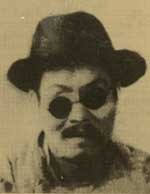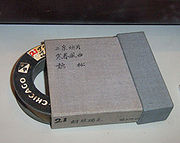
Abing
Encyclopedia


Erhu
The erhu is a two-stringed bowed musical instrument, more specifically a spike fiddle, which may also be called a "southern fiddle", and sometimes known in the Western world as the "Chinese violin" or a "Chinese two-stringed fiddle". It is used as a solo instrument as well as in small ensembles...
and pipa
Pipa
The pipa is a four-stringed Chinese musical instrument, belonging to the plucked category of instruments . Sometimes called the Chinese lute, the instrument has a pear-shaped wooden body with a varying number of frets ranging from 12–26...
.
Life
Abing was born on August 17, 1893 in the eastern Chinese city of WuxiWuxi
Wuxi is an old city in Jiangsu province, People's Republic of China. Split in half by Lake Tai, Wuxi borders Changzhou to the west and Suzhou to the east. The northern half looks across to Taizhou across the Yangtze River, while the southern half also borders the province of Zhejiang to the south...
to father Hua Qinghe, who was a Taoist
Taoism
Taoism refers to a philosophical or religious tradition in which the basic concept is to establish harmony with the Tao , which is the mechanism of everything that exists...
priest. His mother was a widow, and her re-marriage to a priest was resented by her family; she remained depressed and died a year after Abing's birth. Abing was raised by extended family until the age of eight, when he went to live with his father at the temple. Abing was the name used by his family. He was given the official name Hua Yanjun at this time and sent to school.
Abing's father was proficient in a number of musical instruments and Taoist
Taoism
Taoism refers to a philosophical or religious tradition in which the basic concept is to establish harmony with the Tao , which is the mechanism of everything that exists...
religious music
Religious music
Religious music is music performed or composed for religious use or through religious influence.A lot of music has been composed to complement religion, and many composers have derived inspiration from their own religion. Many forms of traditional music have been adapted to fit religions'...
. His father trained him in drums from the age of 10. Abing began learning the dizi at age 12, then the erhu, undergoing a rigorous set of training, such as playing the flute with weights attached to the end of the flute to increase the power of his wrist. At age 17, Abing first performed in religious ceremonies, and won acclaim for his musical talent, presentation, and voice.
In 1914, upon the death of his father, Abing took charge of the temple along with his cousin. However, badly run operations at the temple, and an opium
Opium
Opium is the dried latex obtained from the opium poppy . Opium contains up to 12% morphine, an alkaloid, which is frequently processed chemically to produce heroin for the illegal drug trade. The latex also includes codeine and non-narcotic alkaloids such as papaverine, thebaine and noscapine...
addiction, drove Abing into poverty. At the age of 34, he contracted syphilis
Syphilis
Syphilis is a sexually transmitted infection caused by the spirochete bacterium Treponema pallidum subspecies pallidum. The primary route of transmission is through sexual contact; however, it may also be transmitted from mother to fetus during pregnancy or at birth, resulting in congenital syphilis...
and progressively lost sight in both his eyes. He became homeless and earned a living as an itinerant street performer. In 1939, he married Dong Caidi (董彩娣), a country widow in Jiangyin
Jiangyin
Jiangyin is a city in China's Jiangsu province on the Yangtze River. It has population of 1.2 million . The total GDP reached RMB 171.3 billion yuan in 2009, an increase of 11.6% from 2008. The GDP per capita reached RMB 142,572 yuan...
.
After his marriage, Abing performed every afternoon in a public square in Wuxi. He became famous for incorporating topical issues into his music and songs, especially the war with Japan
Second Sino-Japanese War
The Second Sino-Japanese War was a military conflict fought primarily between the Republic of China and the Empire of Japan. From 1937 to 1941, China fought Japan with some economic help from Germany , the Soviet Union and the United States...
. After the performance, he would walk through the city's streets, playing the erhu. This was a period of prolificacy for Abing, and his most famous composition, Erquan Yingyue, was performed in this period.
After the Japanese takeover of Wuxi, Abing travelled to Shanghai
Shanghai
Shanghai is the largest city by population in China and the largest city proper in the world. It is one of the four province-level municipalities in the People's Republic of China, with a total population of over 23 million as of 2010...
, while his wife went to her home village. In Shanghai, Abing played music for a kunqu
Kunqu
Kunqu , also known as Kunju , Kun opera or Kunqu Opera, is one of the oldest extant forms of Chinese opera. It evolved from the Kunshan melody, and dominated Chinese theatre from the 16th to the 18th centuries. The style originated in the Wu cultural area...
opera company. In 1939, he returned to Wuxi and his old routine. However, his musical current affairs commentary also irked the authorities, and after 1945 he was prohibited from singing about news items at his usual place of performance. In 1947, Abing suffered a severe bout of lung disease. He stopped performing, and earned a living repairing huqin
Huqin
Huqin is a family of bowed string instruments, more specifically, a spike fiddle popularly used in Chinese music. The instruments consist of a round, hexagonal, or octagonal sound box at the bottom with a neck attached that protrudes upwards...
.
In the summer of 1950, two professors of the Central Conservatory of Music
Central Conservatory of Music
The Central Conservatory of Music is the national leading music school in Beijing, China.Founded in 1950, the Conservatory offers courses to both Chinese nationals and foreign students, and caters for all levels from primary up to postgraduate programmes...
, Yang Yinliu
Yang Yinliu
Yang Yinliu was a musicologist from the People's Republic of China. He is the editor of the Zhongguo yinyue cidian . He was born in Wuxi, Jiangsu, and was professor at Central Conservatory of Music in Beijing.One part of his research was dedicated to the Chinese folk musician Hua Yanjun Yang...
and Cao Anhe, both Wuxi natives, travelled to Wuxi to record Abing. By this time, Abing had not performed for almost three years. After three days' practice, and in two sessions, three erhu pieces and three pipa pieces were recorded. However, Abing's favourite piece, Meihua Sannong, was not recorded when the team ran out of blank records.
The recording brought Abing wider acclaim, and in September he was offered a teaching position with the Central Conservatory of Music. However, he was by this time too ill to accept, and died on December 4, 1950. He was buried in the graveyard of the temple where he was born. His wife also died three months later.
Influence
Abing's most famous piece is entitled Erquan Yingyue (二泉映月), which is named after a spring in WuxiWuxi
Wuxi is an old city in Jiangsu province, People's Republic of China. Split in half by Lake Tai, Wuxi borders Changzhou to the west and Suzhou to the east. The northern half looks across to Taizhou across the Yangtze River, while the southern half also borders the province of Zhejiang to the south...
(which is today part of Xihui Park
Xihui Park
Xihui Park is a park located west of Wuxi, Jiangsu, China, overlooking the city and Lake Tai. It was established in 1958 and includes the Jichang Yuan Garden. At the park entrance is a path leading to the Dragon Light Pagoda on top of Xi Shan...
). It is still played as a standard erhu piece, although it necessitates a special set of strings that are tuned lower than normal erhu strings.
He was only recorded very late in his life, but despite to the scarcity of documentation of his music he is nevertheless considered to be one of the most important Chinese musicians of the 20th century.
His signature pieces, such as Erquan Yingyue, have become classics of Chinese erhu and pipa music.
His music can be heard on The Norton Recordings, ninth edition.
Abing's family home in Wuxi was destroyed by floodwaters in 1991, but rebuilt in 1993 and is now a memorial to Abing and his music.
Further reading
- Stock, Jonathan P. J. (1996). Musical Creativity in Twentieth-Century China: Abing, His Music, and Its Changing Meanings. Rochester, New York: University of Rochester Press.
- "Musical Narrative, Ideology, and the Life of Abing", Jonathan P. J. Stock, Ethnomusicology, Vol. 40, No. 1 (Winter, 1996), pp. 49–73
External links
- Abing biography
- China Central Television: The Story of Abing
- Moon Reflected on Second Spring An article about Erquan Yingyue and Abing with three music videos

